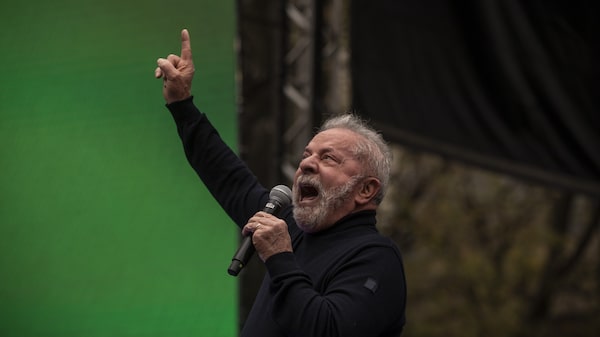Bloomberg — Former President Luiz Inacio Lula da Silva and incumbent Jair Bolsonaro had their first in-person confrontation of Brazil’s election campaign Sunday during a stormy televised debate that set the tone of the contest with five weeks to go.
The two front-runners didn’t waste any time before attacking each other, with Bolsonaro branding Lula’s government “the most corrupt in history” and his rival accusing the president of “destroying Brazil.” Ciro Gomes and Simone Tebet, two other presidential candidates sharing the stage, also focused most of their attacks on Bolsonaro.
The face-to-face debate organized by Band TV network was one of the main events so far of the campaign for the Oct. 2 election. Yet while Bolsonaro and Lula represent radically different paths for Latin America’s largest economy, the lack of policy specifics or surprises in the almost three-hour long encounter is unlikely to make it a game changer.
Bolsonaro, a 67-year-old former army officer, lost support over his handling of the Covid-19 pandemic, which saw Brazil record more than 600,000 deaths. Now, however, polls show the economy to be the biggest voter concern by some way.
While Lula, 76, leads all major polls ahead of the first round, his margin over Bolsonaro has been shrinking as the government unleashes stimulus measures including cash stipends for the poor and tax cuts on goods including gasoline. Inflation is also turning the corner, with consumer prices registering its biggest monthly drop since 1980 in July after peaking at more than 12%.
Read more about the elections in Brazil:
During the debate in Sao Paulo, Bolsonaro lashed out at one of the female journalists acting as a moderator. The move was condemned by the other candidates and put the president on the defensive over his policies for women -- a demographic in which he trails by a bigger gap than in the population at large.
When gender equality and women’s issues continued to come up, Bolsonaro defended his government’s record and dismissed the criticisms, saying that “women love me.”
“It was a poor debate in terms of ideas,” said Creomar de Souza, chief executive officer at Dharma Political Risk and Strategy, a Brasilia-based consultancy. “Lula wanted to avoid a confrontational tone trying to pick some support from center-wing voters while Bolsonaro made a speech for his own supporters but lost support and engagement when he attacked a female journalist.”
If the event was short on policy, it didn’t lack drama. Before the debate started, security for Lula and Bolsonaro asked that they not stand next to each other, as had been planned. A tussle broke out between advisers of the two camps. The men -- Ricardo Salles, a former environment minister, and ex-presidential candidate Andre Janones -- had to be separated by security staff, according to videos posted on social media.
A poll by Instituto FSB Pesquisa released by Banco BTG Pactual SA on Monday morning showed Lula with 43% vote intention, followed by Bolsonaro with 36%, Gomes with 9% and Tebet at 4%. In the runoff scenario, Lula appears winning the election with 52% versus 39% for Bolsonaro. The survey was conducted by telephone among 2,000 people between Aug. 26-28, with a margin of error of two percentage points.
Air Time
On Saturday, presidential hopefuls aired their first TV and radio ads, a key aspect of political campaigns in the country. Each candidate is alloted time based on the size of their coalition, meaning that Lula will appear more often and for longer, followed by Bolsonaro and Tebet.
The leading challengers both touched on poverty on their first spots. Bolsonaro touted his Auxilio Brasil cash aid program, which he pledged to keep at the increased level of 600 reais ($118) per family into next year rather than letting it expire in December. Lula, meanwhile, mentioned unemployment, hunger and inflation, contrasting “Bolsonaro’s Brazil” with “Lula’s Brazil” and promising he will once again improve people’s lives.
Recalling his two terms in office has been a frequent strategy for Lula, who has yet to give much detail about his future plans for the $1.8 trillion economy. He struck a similar tone on Sunday night, saying that his Brazil “is the one people miss.”
When challenged by one of his fellow candidates, who said she didn’t recall the country being that good during his time, Lula fired back: “Your driver saw it, your gardener saw it, your cleaning lady saw it. Your cleaning lady saw this country get better, she saw she could eat lunch and dinner every day, that her son could go to college.”
Bolsonaro’s clashes with the Supreme Court and criticism of Brazil’s voting system, a frequent topic of media coverage that has spurred open letters in defense of democracy signed by bankers and jurists, barely came up during the debate.
The president instead touted his cash transfer program and economic track record and defended his actions during the coronavirus pandemic, saying Brazil “worked miracles.” He also attacked Lula, calling the ex-president a “former convict” several times.
Lula led the government between 2003 and 2010, and left as one of Brazil’s most popular presidents ever following a commodities boom that produced rapid economic growth and pulled millions out of poverty. His reputation and that of his Workers’ Party was tarnished by economic missteps of his hand-picked successor and the so-called Carwash corruption probe, which put him in jail for almost a year and a half. His convictions were later tossed out by the Supreme Court on procedural grounds.
Bolsonaro was elected in 2018 amid a sweeping anti-corruption wave. While his government approved a much-awaited pension system reform in 2019, most of his economic agenda was derailed by the coronavirus pandemic. His controversial stances on the pandemic and combative rhetoric on environmental protection helped erode his popularity, leaving him trailing Lula by some 15 percentage points.
Sunday’s debate was co-organized by newspaper Folha de S.Paulo, website UOL and TV Cultura.
Read more at Bloomberg.com




